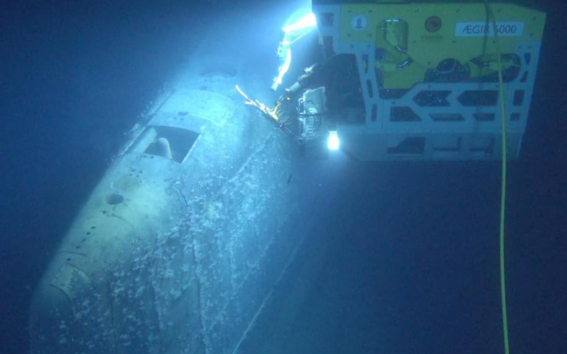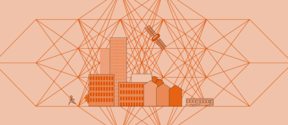The ND Expert Seminar discussed the dismantling of hazardous sunken nuclear submarines in the Arctic

The Northern Dimension Environmental Partnership Nuclear Window (NDEP NW) is an established platform for eliminating nuclear hazards inherited from the Soviet nuclear fleet operations in the Arctic. The NDEP NW projects focus on handling, removal, and transportation of spent nuclear fuel in Northwest Russia. After years of terrestrial nuclear cleanup, Russia and international actors are now shifting their focus on nuclear hazards in the marine environment.
The NDEP nuclear projects are administered by the European Bank for Reconstruction and Development (EBRD), which is the only international financial institution with a nuclear safety mandate. The strength of the NDEP NW projects is their operating model, where the NDEP grants administered by the EBRD act as a catalyst for local and complementary national funding, including in-kind support from the beneficiaries.
The seminar was moderated by Mr. Jari Vilén, Ambassador for Barents and Northern Dimension, Ministry for Foreign Affairs of Finland. Experts from more than 10 countries and EU institutions were in attendance.
The Expert Seminar was opened with official greetings from the NDI, followed by greetings from Ms. Petra Gombalova (Head of Unit, EEAS), and Mr. Adonai Herrera-Martinez (Director of Environmental Funds, EBRD). Ms. Gombalova brought positive news to the seminar from the EBRD Donors' Meeting the week before, where the extension of the Environment Fund's mandate was well received for further discussions. Mr. Herrera-Martinez stressed in his greeting that the key to addressing such large-scale global problems is multilateral cooperation.
The five expert presentations shed light on the topic of nuclear waste cleanup in the Arctic from various perspectives. The speakers shared the view that the Northern Dimension is a natural and functional platform for this type of multilateral cooperation, which has produced excellent results.
Mr. Simon Evans (Head of NDEP NW, EBRD) gave an overview of the ND Environmental Partnership’s nuclear security program on the EBRD agenda. Mr. Evans noted that complementary national funds are essential for sustainable project implementation. He also underlined that knowledge sharing and collaboration between the bodies implementing the projects has proven to be essential.
Mr. Mario Lazzeri (Head, International Affairs and Project Coordination) from the Italian radioactive waste management company Sogin presented the recent EU-funded “Feasibility study and preparation for the implementation of an action plan concerning the safe and secure management or disposal of sunken radioactive objects in the Arctic Sea”. The feasibility study identified two nuclear submarines, K-27 and K-159 as the most critical objects calling for lifting and dismantling. Mr. Lazzeri further emphasized that it is crucial that Russia will establish the necessary legal and regulatory framework for the management of the sunken objects. International cooperation is important in the management of this legacy, too.
Mr. Anatoly Grigoriev (Head of International Technical Assistance Project, Rosatom) presented the Russian State Atomic Energy Corporation Rosatom’s current activities and plans for dealing with Arctic nuclear waste, including the projects implemented in Andreeva Bay, Gremikha, Lepse and Saida. These projects have resulted in the decommissioning of 120 nuclear submarines during the past 20 years. Mr. Grigoriev agreed with the previous speaker that establishing the regulatory framework is the precondition for future projects on the nuclear cleanup of sunken objects. He informed the audience that the Russian Federation has already passed several governmental resolutions to address this issue and that the legislative work is continuing.
Mr. Ingar Amundsen (Head of Section, International Nuclear Safety, DSA) from the Norwegian Radiation and Nuclear Safety Authority addressed the cooperation between Norway and Russia in nuclear safety and legacy issues. Mr. Amundsen described how this bilateral cooperation has focused both on concrete nuclear cleanup work and on regulatory cooperation. Important areas of cooperation have been for example the four international emergency exercises and expeditions to sunken objects that have shed light on the condition of hazardous objects such as K-27 and K-159.
Finally, Mr. Alexandre Gorbatchev, Counsellor for nuclear energy and technologies in the Embassy of France to Russia, discussed the bilateral cooperation between France and Russia in implementing nuclear waste management measures on the Kola Peninsula, and its synergies with multilateral initiatives. For example, findings of bilateral projects on the alarming state of nuclear core materials used in the Arctic motivated the launching of the above-mentioned feasibility study on the management of sunken objects in the Arctic. Mr. Gorbatchev also noted that the equipment and infrastructure built in the bilateral projects could be used in the dismantling of K-27 and K-159.
In his concluding remarks, Mr. Vilén thanked the speakers for their informative presentations, which highlighted the results achieved in nuclear waste management and the challenges for the future. Mr. Vilén emphasized the importance of international cooperation, especially appreciating Russia's willingness to work on the common challenge. Mr. Vilén concluded that the discussion on the topic will certainly continue during Russia's presidency of the Arctic Council starting next May and Finland's forthcoming presidency of the Barents Euro-Arctic Council.
Download the slides used in the presentations
The ND Expert Seminar 'Nuclear Waste Cleanup in the Arctic' was organized in cooperation with the Ministry for Foreign Affairs of Finland.
Read more news

DeployAI Partners Gather for Heart Beat Meeting in Helsinki
The European DeployAI project's partners gathered for the Heart Beat meeting hosted by Aalto University Executive Education in Helsinki.
Aalto computer scientists in ICML 2024
Computer scientists in ICML 2024
In low-hierarchy organisations, even key policy issues are discussed in Slack
In a recent study, Aalto University alumn Lauri Pietinalho, a visiting scholar at New York University's Stern School of Business, and Frank Martela, an assistant professor at Aalto University, investigated how low-hierarchy organisations deal with shared policies in confrontational situations and how authority functions within them.